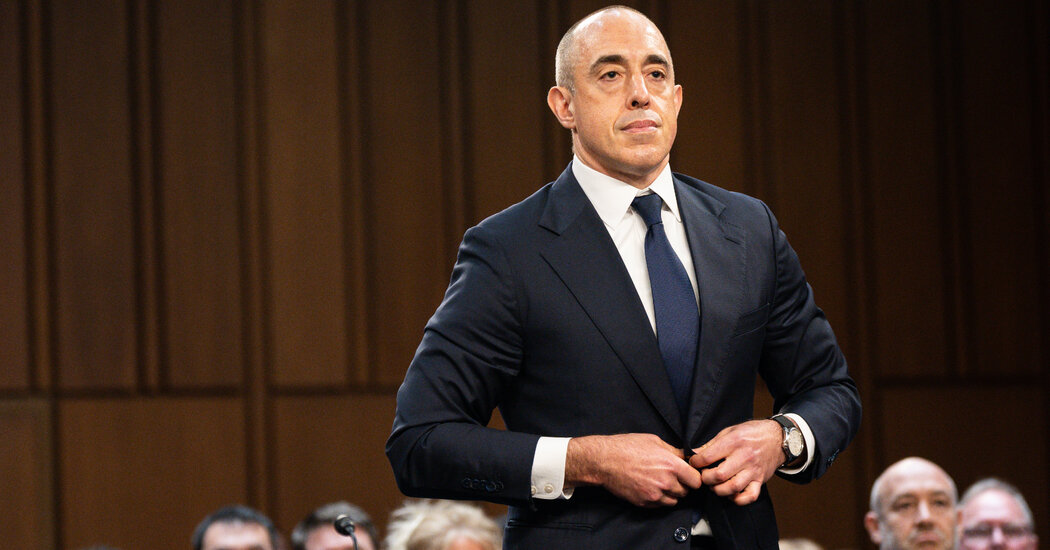A former Justice Department lawyer accused the Trump administration of “thumbing its nose at the courts,” saying his former colleagues were being forced to choose between the president’s agenda and their ethical obligations as attorneys.
In an interview with The New York Times, the lawyer, Erez Reuveni, who filed a detailed whistle-blower claim to the Senate last month, shared his growing sense of alarm as he defended the administration’s aggressive deportation agenda. He said he was willing to testify to Congress or in court about what he described as an intentional effort by the administration to ignore judges and the due process rights of hundreds of migrants.
Mr. Reuveni, speaking publicly for the first time about his experiences, was fired in April after he appeared in court to defend the administration’s mistaken deportation of a man in Maryland, accused of refusing a superior’s directive.
He pointed to the planes of immigrants rapidly flown to a maximum-security prison in El Salvador on March 15, warning that it offered a distressing example of the administration’s disregard for facts and the law. The flights that took off that day also included the Maryland man, Kilmar Armando Abrego Garcia, who was initially detained at the prison, known as CECOT.
“If they can do this sort of thing to Abrego Garcia, to 238 people that nobody knows, and send them to CECOT forever with no due process, they can do that to anyone,” said Mr. Reuveni. “It should be deeply, deeply worrisome to anyone who cares about their safety and their liberty, that the government can, without showing evidence to anyone of anything, spirit you away on a plane to wherever, forever.”
He filed his complaint shortly before Emil Bove III, a senior department official, appeared before lawmakers over his nomination to become a federal appeals court judge. Text messages, phone records and emails viewed by The Times appear to bolster his account.
“The Department of Justice is thumbing its nose at the courts, and putting Justice Department attorneys in an impossible position where they have to choose between loyalty to the agenda of the president and their duty to the court,” Mr. Reuveni added.
A Justice Department spokesman did not immediately respond to a request for comment.
In his whistle-blower complaint, Mr. Reuveni chronicled the lengths the administration appeared willing to go, describing a particularly shocking moment that crystallized its approach. As the officials prepared to invoke a rarely used wartime law to send immigrants to the Salvadoran prison, the complaint said, Mr. Bove told subordinates at a meeting on March 14 that the Justice Department may end up ignoring court orders, using an expletive to underscore his point.
Since those disclosures, Democrats have argued Mr. Bove is unfit to serve on the U.S. Court of Appeals for the Third Circuit, a lifetime appointment one rung below the Supreme Court. Republicans have tried to blunt Mr. Reuveni’s claims by characterizing him as a politically motivated saboteur.
In addition to the confirmation process for Mr. Bove, two federal judges have weighed contempt proceedings into the administration’s handling of the cases cited by Mr. Reuveni.
“I can’t control what they do, but if they wanted to hear from me, I would answer,” Mr. Reuveni said.
The No. 2 official at the Justice Department, Todd Blanche, has denied Mr. Reuveni’s account, asserting he was at the same meeting and never heard Mr. Bove suggest the department disregard court orders.
“The claims about Department of Justice leadership are utterly false,” Mr. Blanche has said.
Mr. Reuveni disputed Mr. Blanche’s account. The deputy attorney general, he said, briefly entered the conference room during the March 14 meeting, but only to speak privately with Mr. Bove. Mr. Blanche then left and did not participate in the meeting, Mr. Reuveni said.
Only after the one-on-one discussion between Mr. Bove and Mr. Blanche did Mr. Bove use an expletive to suggest the Justice Department might choose to ignore court orders, Mr. Reuveni said.
In his written answers to the Senate Judiciary Committee, Mr. Bove did not claim that Mr. Blanche was there, but rather said that Mr. Blanche said that he was there.
At his confirmation hearing, Mr. Bove denied the thrust of Mr. Reuveni’s allegations.
“I have never advised a Department of Justice attorney to violate a court order,” Mr. Bove told lawmakers, though when pressed on particulars he said he could not recall specific language that was used.
“I didn’t hear him deny anything unequivocally under oath,” Mr. Reuveni told The Times.
Mr. Reuveni said he came forward for reasons larger than Mr. Bove’s judicial nomination, concerned by what he described as a degradation of the principles of honesty to the courts that have long guided the Justice Department. He noted that he has never been a member of a political party, and spent the first Trump administration zealously defending its immigration policies in court.
But what the administration has sought to do in recent months was far different, he said, a deliberate strategy of deceiving and disregarding federal judges.
To buttress his account, Mr. Reuveni has turned over to Congress text messages, phone records and emails with his colleagues at the Justice Department, the Department of Homeland Security and the State Department, as they wrestled with the legal battle over Mr. Trump’s use of the wartime law, the Alien Enemies Act.
The top Democrat on the committee, Senator Richard J. Durbin of Illinois, said the documents “show that the Department of Justice misled a federal court and disregarded a court order.”
“Mr. Bove spearheaded this effort,” he added, “which demanded attorneys violate their ethical duty of candor to the court.”
Andrea Meza, one of Mr. Reuveni’s lawyers at the Government Accountability Project, added that the records demonstrated “why it is clearly in the public’s interest for the full truth to come out.”
In his complaint and in the interview with The Times, Mr. Reuveni said another Justice Department lawyer, Drew Ensign, misled a federal judge on March 15, when the administration sent several planes of migrants to El Salvador. Mr. Ensign, appearing at a hastily convened hearing, informed the judge that he did not know whether such removals were imminent.
The written communications, viewed by The Times and shared with Congress, appear to corroborate Mr. Reuveni’s account. A colleague listening to the hearing texted Mr. Reuveni an expletive, followed by: “That was just not true.” The same colleague added: “He knows there are plans for AEA removals within the next 24 hours.”
Mr. Reuveni replied, “Yes he does.”
The career lawyers trying to navigate the issue often engaged in gallows humor about their situation.
“Guess it’s find out time” on how the courts would respond to the administration, Mr. Reuveni texted a colleague that evening. “Yup, it was good working with you,” the colleague replied ruefully.
Later that evening, Mr. Reuveni sent another text, which referred to Mr. Bove’s expletive from the previous day.
“Guess we are going to say fuck you to the court,” Mr. Reuveni texted. “Super.”
His colleague responded, “Well, Pamela Jo Bondi is,” then added, “not you.”
A few days later, as Mr. Reuveni became more dismayed at the administration’s confrontational posture, he texted a colleague in frustration: “At this point, why don’t we just submit an emoji of a middle finger as our filing.”
The messages supplied by Mr. Reuveni paint a startling picture of an administration determined to send the men to a foreign prison without judicial review first, a decision that itself exposed major fissures within the ranks of government officials.
On multiple occasions, records he gave to Congress show, State Department officials offered to begin negotiations with the Salvadoran government to get Mr. Abrego Garcia back to the United States.
Officials at the Department of Homeland Security, however, adamantly resisted, seeking instead to argue that the man was a dangerous gang member who could not be returned. Career lawyers at the Justice Department struggled to carry out ambiguous instructions from their superiors in apparent contradiction of judicial orders.
Those tensions escalated in late March and early April, as judges demanded information that Mr. Reuveni and other lawyers did not have.
“Neither D.H.S. nor D.O.J. leadership is willing to answer any of these questions right now,” Mr. Reuveni wrote in an email on April 1. “I am getting nowhere with anyone. Leadership appears committed on not answering anything until ordered to do so.”
Devlin Barrett covers the Justice Department and the F.B.I. for The Times.
The post Justice Dept. Whistle-Blower Warns of Trump Administration’s Assault on the Law appeared first on New York Times.




